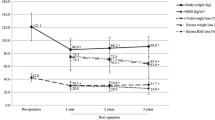Abstract
Background
Weight loss and nutritional status 5 or more years after Roux-en-Y gastric bypass was prospectively documented. The hypothesis was that even after clinical adaptation, imbalances might still occur.
Methods
Seventy-five consecutive patients (age 49.3 ± 10.6 years, 89.3% females) were recruited 83.4 ± 14.3 months after the intervention. Weight loss and nutritional abnormalities were registered.
Results
Body mass index (BMI) was 56.5 ± 10.0 preoperatively, 29.4 ± 6. 2 by 24 months and 34.4 ± 14.6 when last seen. Major current deficit occurred for magnesium (32.1% of the patients), hemoglobin (50.8%), iron (29.8%), ferritin (36.0%), zinc (40.5%), vitamin B12 (61.8%), vitamin D3 (60.5%), and β-carotene (56.8%). Low preoperative measurements had already been unveiled for iron, transferrin, zinc, and vitamin B12. Total drug consumption tended to decrease after operation, and present findings correlated with excess weight loss (EWL). Also presence of diabetes and BMI value were predictors of long-term EWL, along with biochemical profile by 2 years. Multivitamin supplementation and gastrointestinal complaints partially correlated with nutritional results.
Conclusions
(1) Good initial weight loss with moderate late regain, anemia, and multiple nutrient deficits was the common pattern. (2) Massive weight loss, frequent vomiting, dumping syndrome, and women in reproductive age were risk factors for hemoglobin or vitamin deficits, whereas superobesity, diabetes, and use of multiple drugs were associated with EWL result. (3) Most laboratory tests became stable by 2 years and along with BMI correlated with late EWL. (4) Two-year nutritional investigation is especially recommended because of its long-term predictive value.

Similar content being viewed by others
References
Sjöström L, Narbro K, Sjöström CD, et al. Effects of bariatric surgery on mortality in Swedish obesity subjects. N Engl J Med. 2007;357:741–52.
Faintuch J, Matsuda M, Cruz ME, et al. Severe protein–calorie malnutrition after bariatric procedures. Obes Surg. 2004;14:175–81.
Chaves LC, Faintuch J, Kahwage S, et al. A cluster of polyneuropathy and Wernicke–Korsakoff syndrome in a bariatric unit. Obes Surg. 2002;12:328–34.
Ishida RK, Faintuch J, Paula AM, et al. Microbial flora of the stomach after gastric bypass for morbid obesity. Obes Surg. 2007;17:752–8.
Kaidar-Person O, Person B, Szomstein S, et al. Nutritional deficiencies in morbidly obese patients: a new form of malnutrition? Part A: vitamins. Obes Surg. 2008;18:870–6.
Kaidar-Person O, Person B, Szomstein S, et al. Nutritional deficiencies in morbidly obese patients: a new form of malnutrition ? Part B: minerals. Obes Surg. 2008;18:1028–34.
Kushner FR. Micronutrient deficiencies and bariatric surgery. Curr Opin Endocrinol Diabetes Obes. 2006;13:405–11.
Allied Health Sciences Section Ad Hoc Nutrition Committee, Aills L, Blankenship J, et al. ASMBS Allied Health Nutritional Guidelines for the surgical weight loss patient. Surg Obes Relat Dis. 2008;4(5 Suppl):S73–108.
Ritz P, Becouarn G, Douay O, et al. Gastric bypass is not associated with protein malnutrition in morbidly obese patients. Obes Surg. 2008;19:840–844.
World Health Organization. Obesity. Preventing and managing the global epidemic. Report of a WHO consultation on obesity. WHO/NUT/NCD/981. Geneva: WHO; 1998.
Pajecki D, Dalcanalle L, de Oliveira CP Souza, et al. Follow-up of Roux-en-Y gastric bypass patients at 5 or more years postoperatively. Obes Surg. 2007;17:601–7.
Pories WJ, Swanson MS, MacDonald KG, et al. Who would have thought it? An operation proves to be the most effective therapy for adult-onset diabetes mellitus. Ann Surg. 1995;222:339–50.
Christou NV, Sampalis JS, Liberman M, et al. Surgery decreases long-term mortality, morbidity, and health care use in morbidly obese patients. Ann Surg. 2004;240:416–23.
Higa KD, Boone KB, Ho T, et al. Laparoscopic Roux-en-Y gastric bypass for morbid obesity: technique and preliminary results of our first 400 patients. Arch Surg. 2000;135:1029–33.
Brolin RE, Leung M. Survey of vitamin and mineral supplementation after gastric bypass and biliopancreatic diversion for morbid obesity. Obes Surg. 1999;9:150–4.
Johansson HE, Zethelius B, Ohrvall M, et al. Serum magnesium status after gastric bypass surgery in obesity. Obes Surg. 2008; in press. doi:10.1007/s11695-008-9536-5.
Granado-Lorencio F, Herrero-Barbudo C, Olmedilla-Alonso B, et al. Hypocarotenemia after bariatric surgery: a preliminary study. Obes Surg. 2008;19:879–82.
Brolin RE, Gorman JH, Gorman RC, et al. Are vitamin B12 and folate deficiency clinically important after Roux-en-Y gastric bypass? J Gastrointest Surg. 1998;2:436–42.
Folope V, Coeffier M, Dechelotte P. Nutritional deficiencies associated with bariatric surgery. Gastroenterol Clin Biol. 2007;31:369–77.
Goldner WS, Stoner JA, Lyden E, et al. Finding the optimal dose of vitamin D following Roux-en-Y gastric bypass: a prospective, randomized pilot clinical trial. Obes Surg. 2009;19:173–9.
Acknowledgments
This investigation was conducted by a multidisciplinary clinical and nutritional team with patients originally registered at the Obesity Surgery Service. The valuable help of Alessandra Rascovski, Alfredo Halpern, and Arthur B. Garrido Jr is appreciated. Financial grants were received from FAPESP 05/53831-0 and CNPq 300392/2008-7. The authors declare no conflict of interest.
Author information
Authors and Affiliations
Corresponding author
Rights and permissions
About this article
Cite this article
Dalcanale, L., Oliveira, C.P.M.S., Faintuch, J. et al. Long-Term Nutritional Outcome After Gastric Bypass. OBES SURG 20, 181–187 (2010). https://doi.org/10.1007/s11695-009-9916-5
Received:
Accepted:
Published:
Issue Date:
DOI: https://doi.org/10.1007/s11695-009-9916-5




